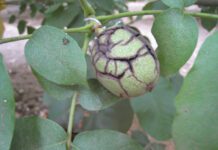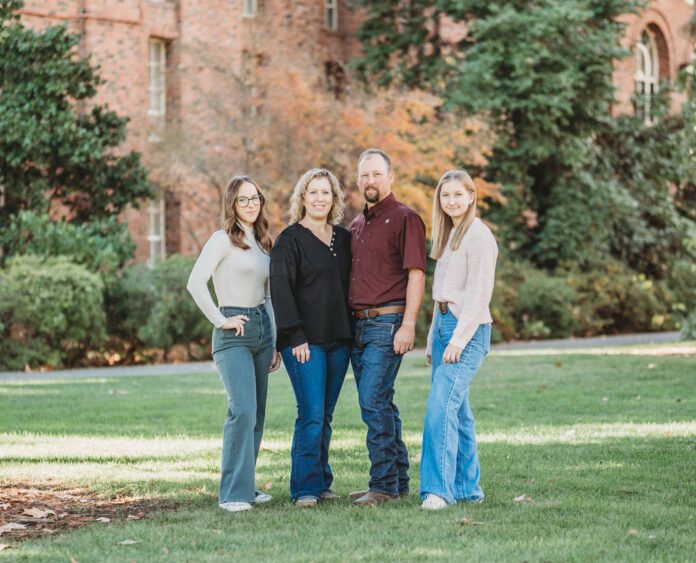
Theresa Schneider, a fourth-generation grower who co-owns A&J Family Farms, Inc. in Chico, Calif. with her mom Janet, does it all on her 200-acre family farm.
“It’s me, myself and I out in the field,” she said.
While her husband and children help, the farm is her business. Schneider didn’t set out to be a grower; she went to school to be an ag teacher but came back to the farm after college to help with the paperwork side of things. She quickly started working in the fields with her dad and took over when he died.
Being a woman in ag comes with some challenges like people assuming her husband is the one in charge, but Schneider loves what she does.
“I’m definitely the minority when I’m attending grower days, meetings and events,” she said. “But I like the adventure of farming.”
Schneider shared her thoughts on the state of the tree nut industry, what it’s like to be a woman in ag and how family farms can survive in the current industry landscape in an interview with West Coast Nut.
Q. Tell us a little bit about your farming operation and how you started farming.
I am here in Butte County, and I farmed with my dad when he was alive. I farmed with him for 15 or so years before he passed, and we farmed primarily walnuts. I farm land that has been in my family for generations. While my mom co-owns the company with me, I handle the day-to day operations. It’s me, myself and I out in the field. My husband has a job off the farm, but he helps me as well when he gets home from that job or on the weekends. If something breaks down, he’s there to fix it.
Q. How long did your dad have the farm?
My father farmed for over 30 years with his brothers and then split the operation in 2000. He went on by himself, and I helped day by day, starting out small. When he passed away, I took over the day-to-day operations.
Q. What drew you into farming?
Well, I actually went to school to be an ag teacher. I’m kind of glad I didn’t. There was a need when I graduated from college, mainly on the office end of things, the bookkeeping side. There’s a lot of paperwork in farming, and my dad, being of the older generation, didn’t want to deal with it. So, I handled it all. There was a need for me to come back. My mom would do the books when she was not working her full-time job. As time progressed, I would help in the office while my daughters were little and then out in the orchards when they went to school.
Over time, through my participation in the farming operation, I started making decisions. I was always going to do something in agriculture. Like I said, I wanted to do education, but I felt the need to come back to the farm. My husband works outside of the farm, and when we got married and decided to have kids, I wanted them to be with me and be around the farm and the next generation.
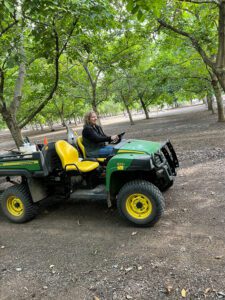
Q. Do your kids have any interest in continuing?
I have two daughters, 15 and 17. They definitely help when we need extra hands, especially in the summer. I could see my youngest possibly taking over in some capacity, but I’m not entirely sure.
Q. Talk about being a woman in ag and what that looks like.
It’s very rare, especially in our area. It’s definitely challenging. Sometimes I find myself still being known as Theresa Bertagna more than Theresa Schneider, just because that’s how people know me.
But I like the challenge. I like working with my hands. I was out spraying this morning, so for me, it’s a fulfilling part of my life. I could never just be one thing. The unknown can sometimes be fun but also stressful. It’s nice to be able to say I can be at my daughter’s softball game because I can make my own schedule and be flexible. So being a woman in ag is difficult, but it’s also very rewarding because I’m doing something not everyone does.
Q. You grew up on the farm, so talk a little about how farming practices have changed over the years.
Well, I grew up moving aluminum pipes during the summer. That’s definitely changed. We’re using soil moisture monitors now. I look at maps and weather reports a lot more than was ever used before. My dad started getting into that, but not as much as I do now. Technology has obviously advanced us, but sometimes we rely on it too much. We have all these great programs for farming, but you still have to be physically present in the orchard. You can’t just rely on tech alone.
Q. What are three things that keep you up at night related to growing nuts?
The price of the commodity is huge right now. We’re hoping for an increase, but nothing is guaranteed. Water is another big concern because, although we live on wells, you never know what will happen. The third thing would be the stress of whether the next generation will continue farming, or if we’re doing all this just for us, rather than passing it on.
Q. We hear from a lot of growers that one of their biggest stresses is whether their kids will continue farming. Do you have any thoughts on how to retain the next generation?
I think it comes down to work ethic. Getting your hands dirty, working out in the fields or orchards, and being actively involved is key. There’s a disconnect with the next generation; I don’t think they want to put in the same level of work that we’ve put in.
Q. What are you most hopeful for in the future, as far as tree nut growing goes?
I hope we can still sell our product, and that this will carry on. Some of our orchards have been in the family for generations, and I’d like to see that continue, though I’m not sure in what capacity. But I think there’s hope in that.
Q. When you think about the future, what do you think needs to happen to make commodity prices go up and make farming viable for the next generation? What’s your solution?
Oh gosh, my magic solution? I think the new Walnut Commission is doing a good job of trying to change the way people think about walnuts, making them a year-round product, not just something for the holidays.
My magic solution would be some kind of government subsidies. We’re in a three-year deficit with walnuts right now, and we’ve gotten a little help, but not enough to really save us. Most farmers are good savers, but our rainy-day funds are running out.
We need to figure out how to make people understand farmers are the most sustainable industry. We’re not wasting water or land; we’re growing a product that people need. There needs to be more clarity about why farmers are here and what we’re doing, and we need to be compensated fairly for it.
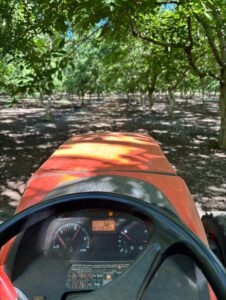
Q. Can you talk about the water situation?
Luckily, we have wells, and so far, nothing has dried out, knock on wood. But we’re being monitored more and more. In the future, we’ll have to have monitoring on our wells, tracking how much water we’re using.
We’re not the kind of people who use water unnecessarily. We use it as efficiently as possible. My concern is the government may regulate us so much that we can’t do what’s best for our trees, farms, and fields. I just hope the regulations don’t shut us down.
Q. The idea of sustainable or regenerative farming is a big deal these days. Have you put any of those practices, like cover crops, into your orchards?
We really haven’t diverted a lot into it because most of our older orchards have such a dense canopy that there’s not enough sunlight for cover crops. In the younger orchards, it just depends on the soil type and what was there before. If we can get in there and do a little cover crop, we try to.
I had a field last year where we did some hay just because it was over 30 years of partly orchards, so we tried to do that. But most of our everyday fields aren’t able to support cover crops.
Q. What do you think the biggest assets are of the tree nut industry in California?
The biggest asset is that most of the industry is still made up of family farms. That’s how everything started, and those family farms need to continue through the generations.
I feel like the industry, especially in Northern California where we are, is still a lot of family farms, not big corporations. I hope that connection gets out there more and helps people in the community understand we’re everyday people growing agricultural commodities they consume.
Q. What would you say is your proudest achievement when it comes to farming?
That we’re still here, still going strong. My proudest achievement is I’ve learned enough from working with my dad, my uncles and my grandpa, and I can continue the farm as a female farmer.
Q. What kind of advice would you give to a young woman getting into the tree nut industry today?
Keep your head on your shoulders, look to the future, and listen to advice, but choose what’s best suited for you. The best advice I got when I was young was to get on a tractor, learn how to plow the fields and be out there with my dad, absorbing all that knowledge. If you can, learn from the older generation and absorb everything you can.
Q. For many farmers, it’s important to be involved and give back. Can you speak about how you’re involved in your community?
I am a youth Grange livestock leader, which is like a 4-H program. I’ve been involved in Grange for years, even before I had kids, and I enjoy working with the youth and helping them see the future.
I’m also on the school board at my daughters’ school, CORE Butte Charter. I recently got accepted into the next class of the California Ag Leadership Program, and I hope to find a new avenue to get involved through that.
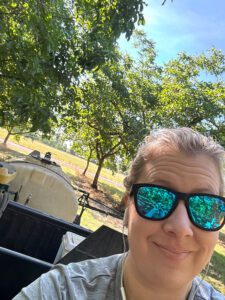
Q. Who was your biggest influence or mentor?
My dad. The most important thing he taught me was hard work. Being a hard worker and never giving up. Just keep trying, keep hustling, keep going.
Q. If you had to pick one thing in the last 20 years that’s made a big advancement for how you manage or work on the farm, what would it be?
I think the biggest advancement has been the soil monitoring systems and irrigation tracking. We can track irrigation and the amount of water getting into the orchard, which is huge. You can go back over the summer and see how much water was used and when. I don’t rely solely on that, but it’s definitely a major advancement.
Q. What kind of advancements do you see in the future, specifically for the family farm?
Honestly, I don’t know what else we can really do on a family farm to make things more efficient. I mean, our tractors are efficient, our equipment is efficient. It would be nice if some of the equipment was a little more budget-friendly. Small family farms are trying to get by on a very small budget, so we’re doing what we can.
Q. Talk about the landscape for the family farmer compared to big corporate farms. How do you compete in that world?
I think, and I’m not necessarily in a position to do it, but a lot of them are trying to diversify more and not have all their eggs in one basket. I’ll probably end up planting some almonds in a couple of orchards instead of staying with just walnuts, so we can diversify a little down the road.
We really have to think outside the box and diversify, or maybe take on an extra manager or extra job someplace to balance things out. We can’t solely rely on just farming small acreage.
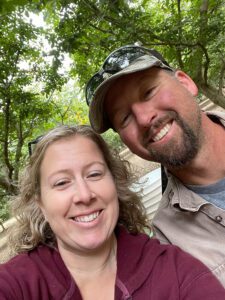
Q. I was talking to someone previously, and they were saying their parents sent four kids to college on a 200-acre farm, which isn’t possible anymore.
My parents did that. They sent me and my sister to really good schools, and I just think, “I don’t know how to do that right now.” Everything’s gone up, chemical prices, everything, but our commodity prices haven’t. So, trying to farm and keep the orchard healthy on a very tight budget is very difficult.
We’re just trying to get by, but with two active teenage daughters and a husband who works off the farm (because it’s my family farm, not his), it’s a different dynamic than most people think. Most people assume he’s the one carrying on the farm, but it’s mine.
He’s very supportive, though. He’s the “all-of-the-above” helper when things break down, and he fixes them for me. I’m not as mechanically inclined as I’d like to be, but I can get by.







